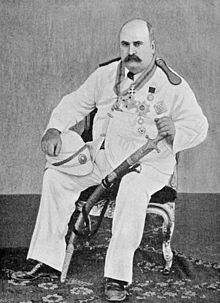Lloyd Mathews
| Lloyd Mathews | |
|---|---|
 |
|
| Born |
7 March 1850 Funchal, Madeira, Kingdom of Portugal |
| Died | 11 October 1901 (aged 51) Zanzibar |
| Nationality | British |
| Occupation | Naval Officer and politician |
Sir Lloyd William Mathews, KCMG, CB (7 March 1850 – 11 October 1901) was a British naval officer, politician and abolitionist. Mathews joined the Royal Navy as a cadet at the age of 13 and progressed through the ranks to lieutenant. He was involved with the Third Anglo-Ashanti War of 1873–4, afterwards being stationed in East Africa for the suppression of the slave trade. In 1877 he was seconded from the navy to Sultan Barghash of Zanzibar in order to form a European-style army; he would remain in the employment of the government of Zanzibar for the rest of his life. His army quickly reached 6,300 men and was used in several expeditions to suppress the slave trade and rebellions against the Zanzibar government.
Mathews retired from the Royal Navy in 1881 and was appointed Brigadier-General of Zanzibar. There followed more expeditions to the African mainland, including a failed attempt to stop German expansion in East Africa. In October 1891 Mathews was appointed First Minister to the Zanzibar government, a position in which he was "irremovable by the sultan". During this time Mathews was a keen abolitionist and promoted this cause to the Sultans he worked with. This resulted in the prohibiting of the slave trade in Zanzibar's dominions in 1890 and the abolition of slavery in 1897. Mathews was appointed the British Consul-General for East Africa in 1891 but declined to take up the position, remaining in Zanzibar instead. Mathews and his troops also played a key role in the ending of the Anglo-Zanzibar War of 1896 which erupted out of an attempt to bypass the requirement that new Sultans must be vetted by the British consul. During his time as first minister Mathews continued to be involved with the military and was part of two large campaigns, one to Witu and another to Mwele.
...
Wikipedia
